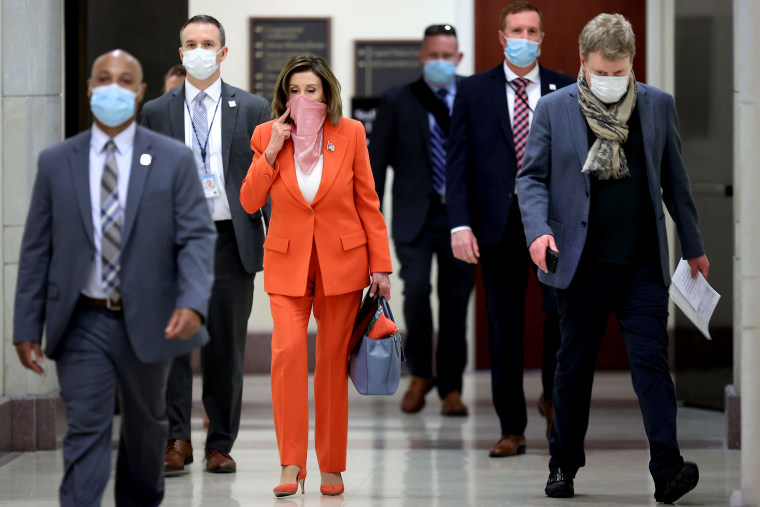WASHINGTON — A day after announcing that the House would reconvene in Washington next week, House Democrats reversed course and said Tuesday that lawmakers won't be returning to the Capitol after all because of the coronavirus threat.
"We made a judgment that we will not come back next week," House Majority Leader Steny Hoyer, D-Md., said in a phone call with reporters.
Hoyer said he spoke with the House physician late Monday about the decision. He cited a rising number of coronavirus cases in metropolitan Washington.
"We will not come back next week, but we hope to come back very soon to consider CARES 2 legislation," Hoyer said, referring to the next round of major coronavirus relief legislation, which would mirror the $2 trillion package signed into law in late March.
Asked about the decision, House Speaker Nancy Pelosi, D-Calif., said during a separate news call: "We had no choice. If the Capitol physician recommends that we not come back, then we have to take that guidance in the interest of the safety of the people who work here.
"We could not take any chances," she added, noting that many people other than lawmakers work at the Capitol, such as office and custodial staff.
Pelosi said she doesn't think House members' physical absence puts them at a disadvantage. Lawmakers are "constantly working" and preparing legislation for the next round of coronavirus aid, she said.
Democratic leaders originally told rank-and-file members during a caucus conference call Monday that the House was expected to be in session starting next Monday. They also advised members that floor votes would also be possible next week.
Full coverage of the coronavirus outbreak
Meanwhile, the Senate is expected to return to the Capitol on Monday.
"We will modify routines in ways that are smart and safe, but we will honor our constitutional duty to the American people and conduct critical business in person," Senate Majority Leader Mitch McConnell, R-Ky., said in a statement Monday afternoon.
"The Senate must focus on concrete steps to strengthen our response to this complex crisis. We cannot get distracted by pre-existing partisan wish lists or calls to paper over decades of reckless decisions that had nothing to do with COVID-19," McConnell added.
Many members live in states where stay-at-home orders are in effect, and one such order is in effect for Washington, D.C., at least through May 15. Mayor Muriel Bowser has said the number of COVID-19 cases there was expected to peak later than in New York City. According to data provided by the District of Columbia, nearly 4,000 people in the city had tested positive for the disease and 190 people had died as of Monday.
Bowser said during a news conference Monday that Washington hasn't met federal guidelines to begin reopening, which include 14 days of sustained decline in the number of cases.
Interviews with more than a dozen lawmakers and aides made it clear that striking a balance between effective legislating and individual safety is an ongoing challenge — one that has all but paralyzed Congress as divisions emerge along generational and partisan lines.
"There was significant unrest in our caucus about coming back on the 4th," House Majority Whip Jim Clyburn, D-S.C., said in an interview. A Democratic aide called the situation a "dumpster fire."
Calling it "beyond inexcusable" that the mechanisms to hold virtual hearings and vote haven't been put into place, a freshman member of Congress said, "The appetite for a change in leadership, generationally and philosophically, is growing by the day."
Others who spoke with NBC News expressed their belief that younger members, as well as those from swing districts, were agitating to return over the objections of a "silent majority," as a Democratic member put it.
"The silent majority of the House — whose voices aren't ever heard — were heard last night, and they said loud and clear that common sense must finally prevail over what the freshmen are calling for and we need the safety of the institution and the country to matter," the member said.
Work is continuing remotely on the next rescue package, which is expected to include more money for states and local governments, along with possible replenishment of relief programs already in effect. But neither the House nor the Senate have protocols to vote to pass legislation remotely, and partisan divisions have stalled efforts to institute them.
Download the NBC News app for full coverage and alerts about the coronavirus outbreak
Senate Minority Leader Chuck Schumer, D-N.Y., sent a letter to McConnell on Tuesday arguing that the Senate should come back only to consider coronavirus legislation and to conduct oversight of the rescue programs.
"If we are going to be in D.C. with the coronavirus raging, it is critically important that we continue and actually ramp up our messaging and activities on the oversight front," Schumer told Democratic senators on a conference call Tuesday, according to an aide on the call.
"We must hold the administration accountable for the mistakes they are making on the small-business program, hospitals, testing and more," Schumer added.
Without the House, the Senate can unilaterally deal only with confirmations. Next week, Republicans plan to hold a hearing for a judicial nominee to the critical D.C. Circuit Court of Appeals.
"It's a dangerous move that achieves nothing," a Democratic aide said of McConnell's decision to call the Senate back. "It would be one thing if this were necessary to addressing the crisis and help people, but it's not about that."



